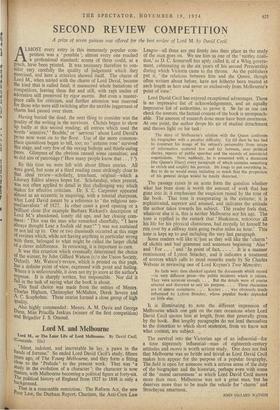Lord M. and Melbourne
Lord M., or The Later Life of Lord Melbourne. By David Cecil. (Constable. 21s.) hands Silent, indolent, and inscrutable he lay, a pawn in the eands of fortune.' So ended Lord David Cecil's study, fifteen Years ago, of The Young Melbourne, and they form a fitting close to the Prelude' to the present work. That was ' a study in the evolution of a character '; the character is now _Mature. with Melbourne becoming a political figure at forty-six.
bpolitical history of England from 1827 to 1848 is only a ackground. That is a reasonable restriction. The Reform Act, the new Poor Law, the Durham Report, Chartism, the Anti-Corn Law League—all these are put firmly into their place as the study of the man goes on. We see him as one of the motley coali- tion,' as D. C. Somervell has aptly called it, of a Whig govern- ment, culminating in the six years of his second Premiership during which Victoria came to the throne. As the publishers put it, the relations between him and the Queen. though often written about before, have not hitherto been treated at such length as here and never so exclusively from Melbourne's point of view.' • Lord David Cecil has enjoyed exceptional advantages. There is an impressive list of acknowledgements, and an equally impressive list of authorities, to prove it. Se far as one can check the sources, the factual content of the book is unimpeach- able. The amount of research done must have been enormous. At one point, the author drops his air of studied detachment and throws light on his task : The story of Melbourne's relation with the Queen confronts his biographer with a peculiar difficulty. Up till then he has had to construct his image of his subject's personality from scraps of information scattered few and far between, over political diaries, reports of public speeches and the records of ministerial negotiations. Now, suddenly, he is presented with a document [the Queen's Diary] every paragraph of which' contains something to enrich and amplify his portrait. He longs to put everything in. But to do so would mean including so much that the proportion of his general design would be fatally distorted.
The passage raises in an acute form the question whether what has been done is worth the amount of work that has gone into it; it emphasises the suspicion raised by the tone of the book. That tone is exasperating in the extreme; it is sophisticated, superior and amused, and indicates the attitude the author takes towards his subject. The reader feels that, whatever else it is, this is neither Melbourne nor his age. The tone is typified in the remark that Huskisson, notorious all his life for his physical clumsiness, had recently let himself be .run over by a railway train going twelve miles an hour.' This tone is kept up to and including the very last paragraph.
Some readers will like it, just as they will like the charm' of clichés and bad grammar and sentences beginning ' Alas' and For . . . ' and ' In point of fact. . . . ' It is a manner reminiscent of Lytton Strachey, and it indicates a treatment of sources which calls to mind remarks made by Sir Charles Webster in reviewing one of Lord Keynes's Two Memoirs: Its facts were then checked against the documents which record —in very different prose—the public incidents which it relates. They were accurate enough. . . . But the details were of course selected and distorted to suit his purpose. . . . These characters are of course caricatures. . . . Keynes . . . was obviously much influenced by Lytton Strachey, whose popular books depended on little else.
It is illuminating to note the different impression of Melbourne which one gets on the rare occasions when Lord David Cecil quotes him at length, from that generally given by the book. But lengthy paragraphs do not lend themselves to the distortion to which short sentences, from we know not what context, are subject.
The survival into the Victorian age of an influential—for a time supremely influential—man of eighteenth-century attitudes and mores is worth serious study. One does not feel that Melbourne was so brittle and trivial as Lord David Cecil makes him appear for the purpose of a popular biography. The.field is open forsomeone with a serious sense of the duty of the biographer and the historian, perhaps even with some of the moral earnestness' at which Lord David Cecil sneers more than once. Melbourne was not a great man, but he deserves more than to be made the vehicle for ' charm' and Stracheyan smartness.










































































 Previous page
Previous page